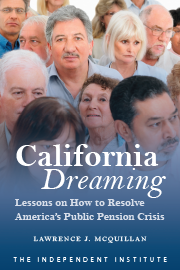America’s economic recovery has been slow by historical standards. Growth has been slow, unemployment stubbornly high, and “green shoots” have wilted fast.
If you listen to some, such as Paul Krugman of the New York Times, the reason for the anemic recovery is that governments at all levels have been “slashing spending in the face of a depressed economy.”
But that’s not the reason at all. The evidence points in the opposite direction: that governments have intervened too much, not too little, creating economic uncertainty. This is what’s killing the economy.
Historically after a recession the unemployment rate falls steadily as job openings increase. After the Great Recession of 2008, however, the unemployment rate has remained stubbornly high, despite increases in posted job vacancies. Why is that?
Two economists with the Federal Reserve Bank of San Francisco, Sylvain Leduc and Zheng Liu, recently looked at various explanations for the anemic jobs recovery and concluded that “heightened uncertainty about economic policy during the recovery [has] made businesses more reluctant to hire workers,” keeping unemployment high.
In their paper, “Uncertainty and the Slow Labor Market Recovery,” the Fed economists gauged policy-related economic uncertainty by measuring, among other factors, the volume of newspaper articles discussing monetary and fiscal policy uncertainty, the number of federal tax code provisions set to expire in future years, and the extent of disagreement among economic forecasters about future inflation rates, government spending levels and similar matters.
Their statistical analysis found that a sharp and sustained jump in economic policy uncertainty before, during, and after the Great Recession accounts for a full two-thirds of the higher than normal post-recession unemployment rate.
Indeed, according to their calculations, the unemployment rate is 1.3 percentage points higher than it would be without such uncertainty: meaning some two million people are unemployed who needn’t be. That’s half the number of long-term unemployed in the country.
The constant chatter and changes to economic policy made businesses hesitant to hire. Changing Fed policies, stimulus programs, the Troubled Asset Relief Program and other bailouts, mortgage schemes, the debt-ceiling and Euro debates, and the costs associated with Obamacare created confusion and doubt about economic policy and what it means for future growth and tax burdens. As a result, potential employers rationally sat on their hands.
Government-driven uncertainty continues with Washington delaying the Obamacare employer mandate, while rolling out an estimated 20,000 pages of rules and regulations implementing the health-care law and some 14,000 pages of regulations implementing the Dodd-Frank financial reform law.
And what about America’s shale-gas boom: Will Washington embrace it or attempt to kill it? One wouldn’t know from the administration’s dithering on the Keystone XL pipeline project.
These and other such questions have only one effect: They create greater uncertainty about the future rules of the road, which hurts commerce and employment.
Imagine the harm if governments randomly changed which color traffic light meant “go” or which side of the road to drive on.
The same applies to economic rules, where stability is crucial to entrepreneurs entering into long-term contracts and making plans to build facilities, purchase equipment, and hire workers.









